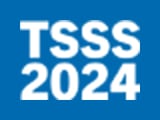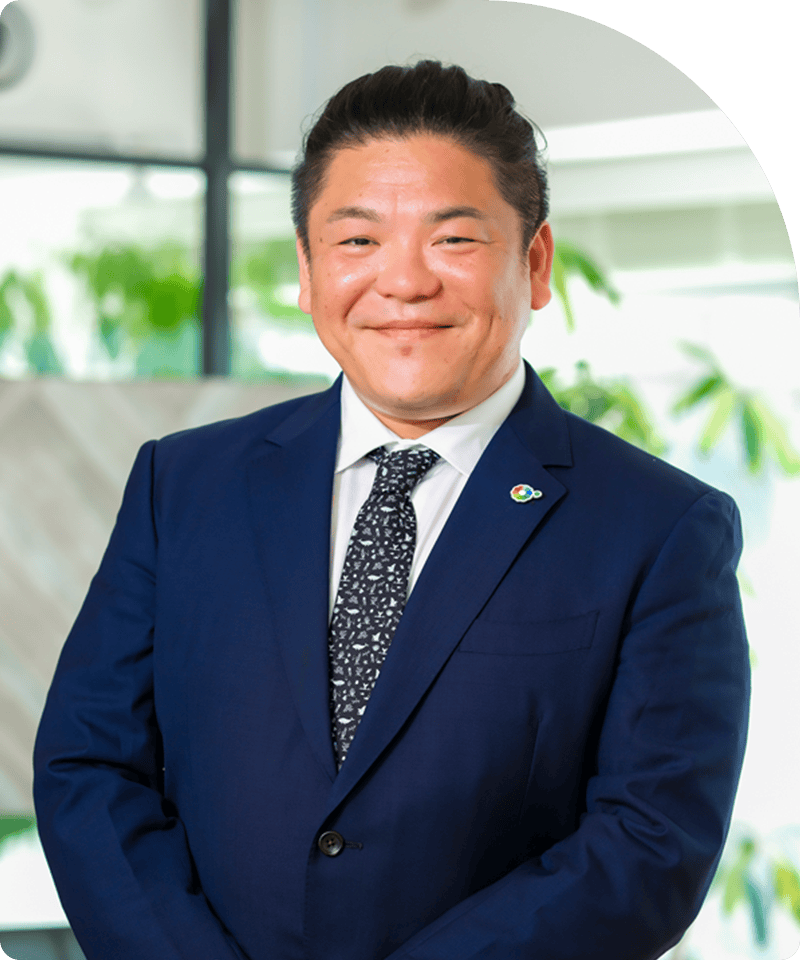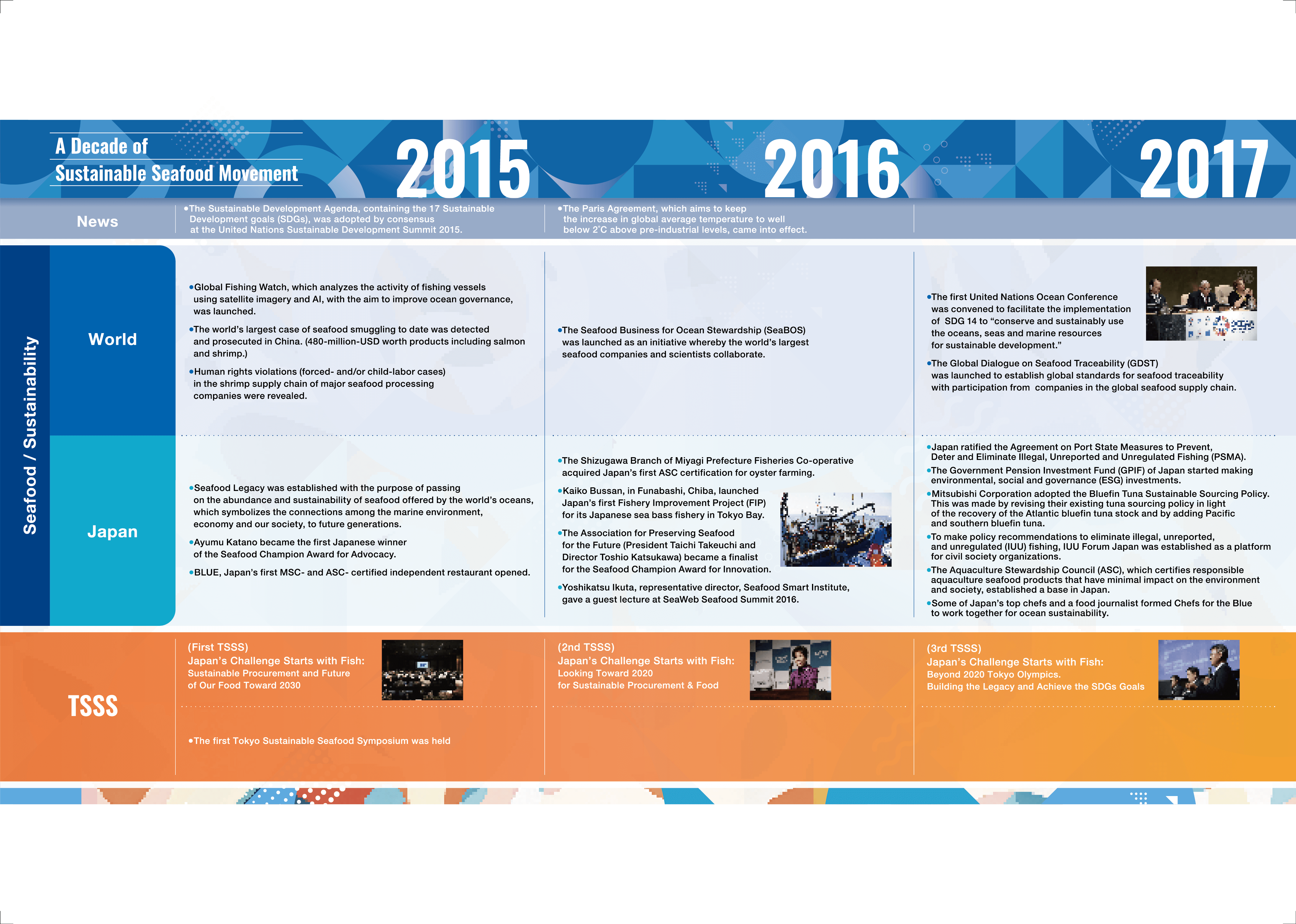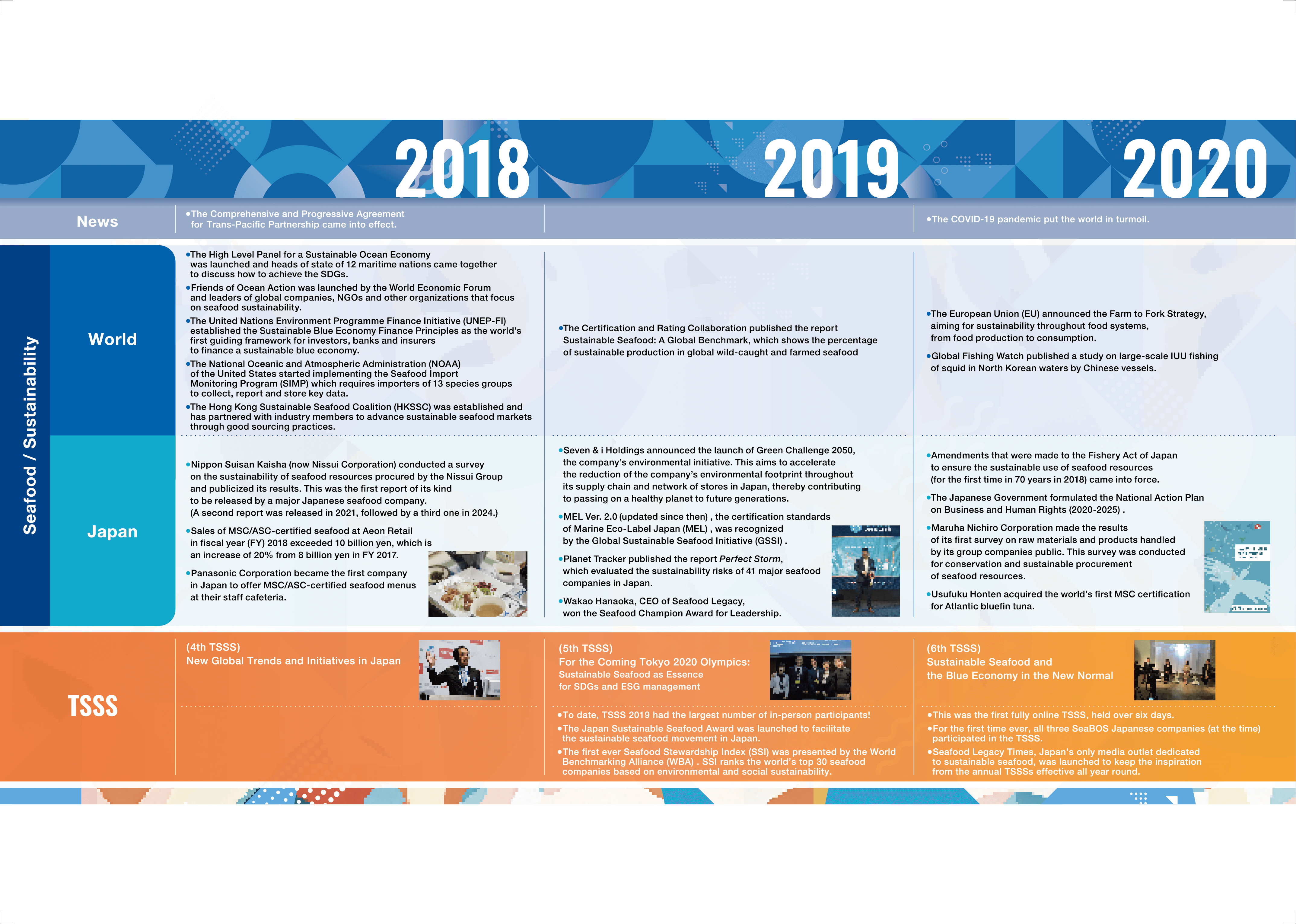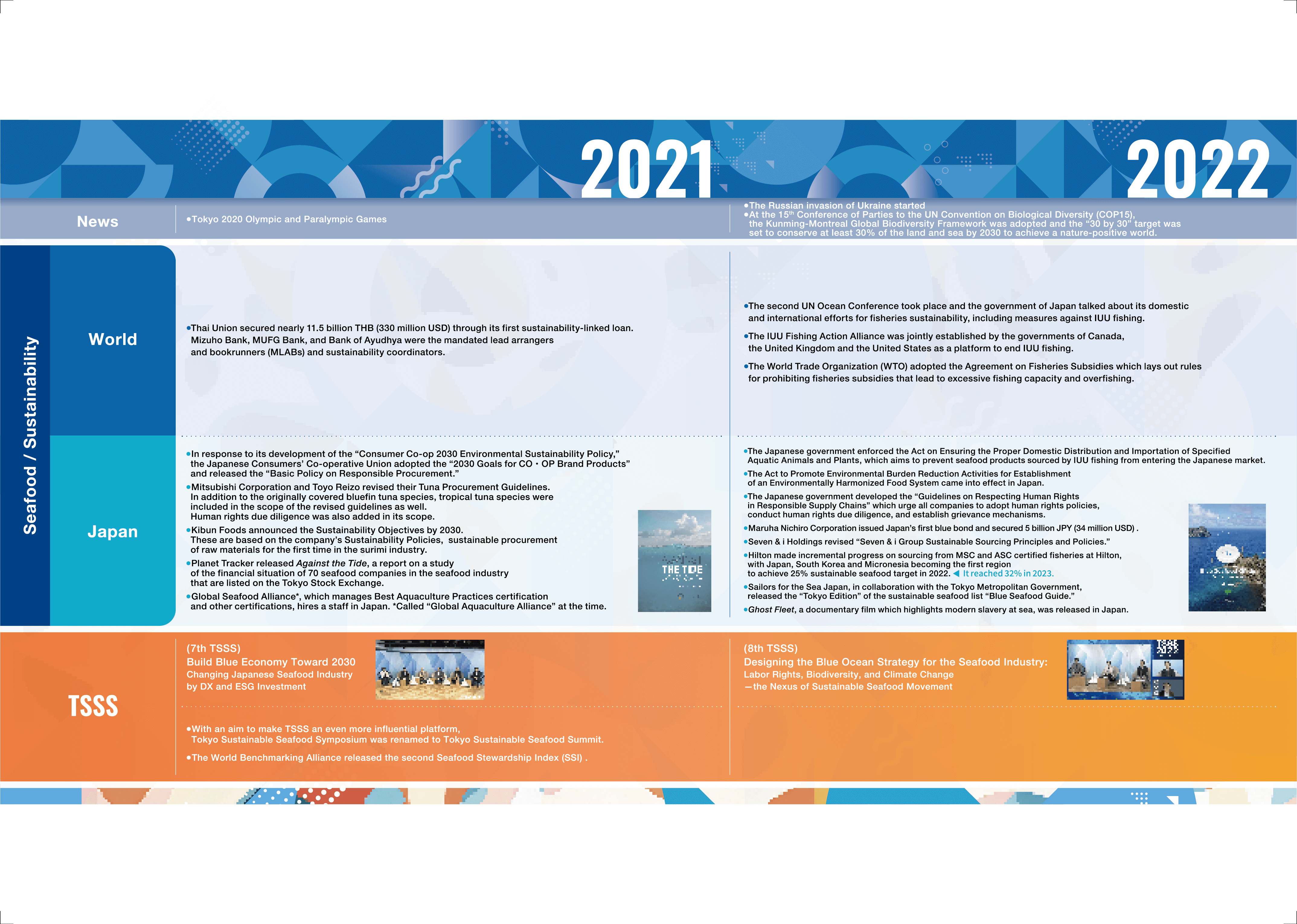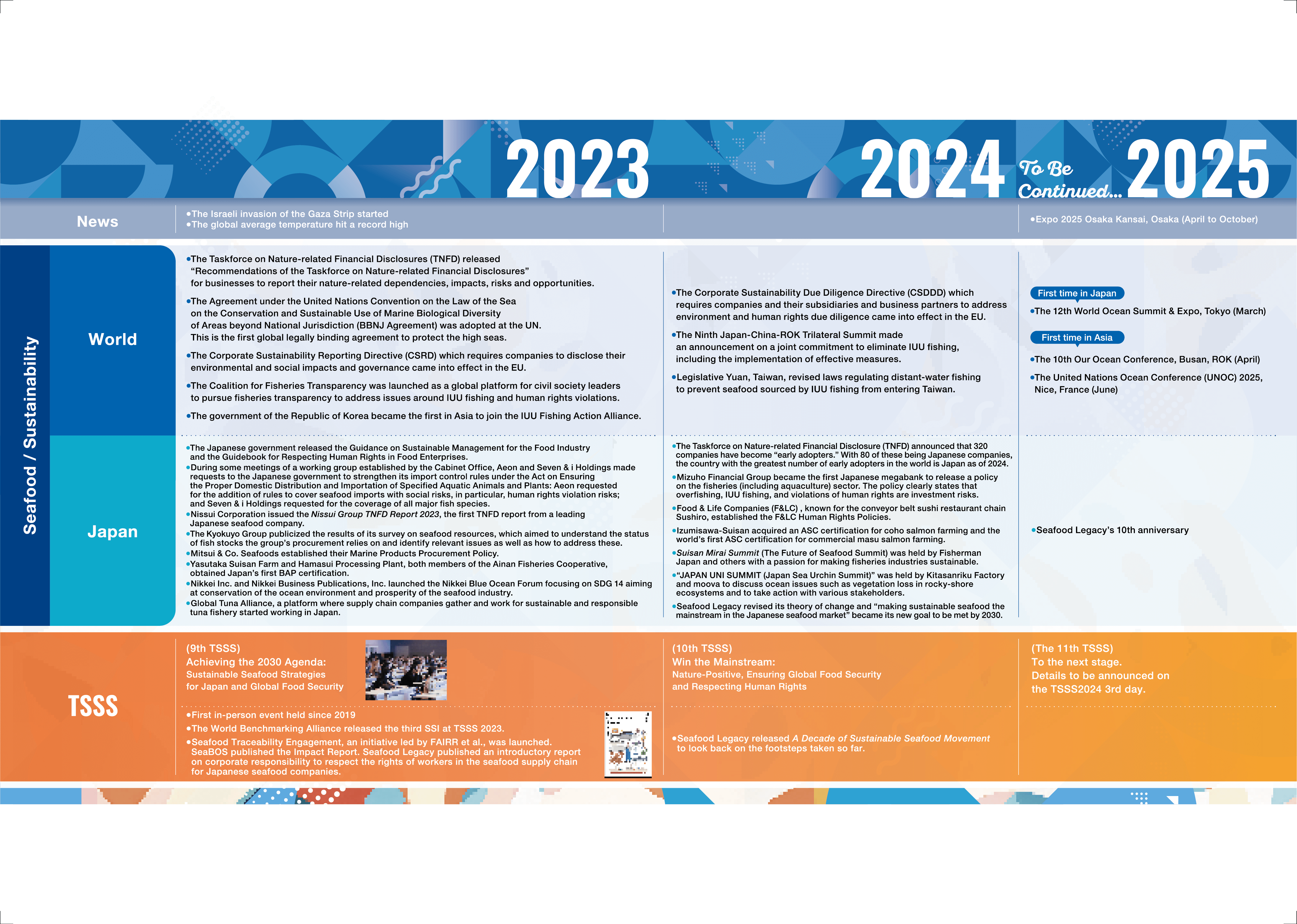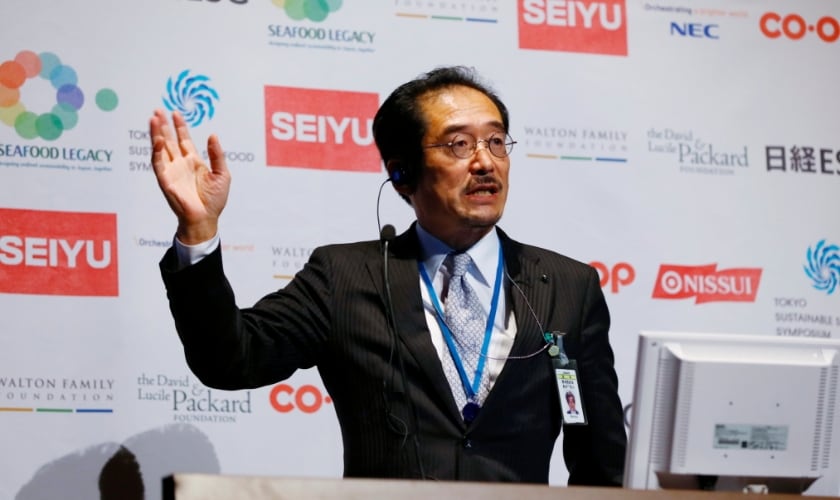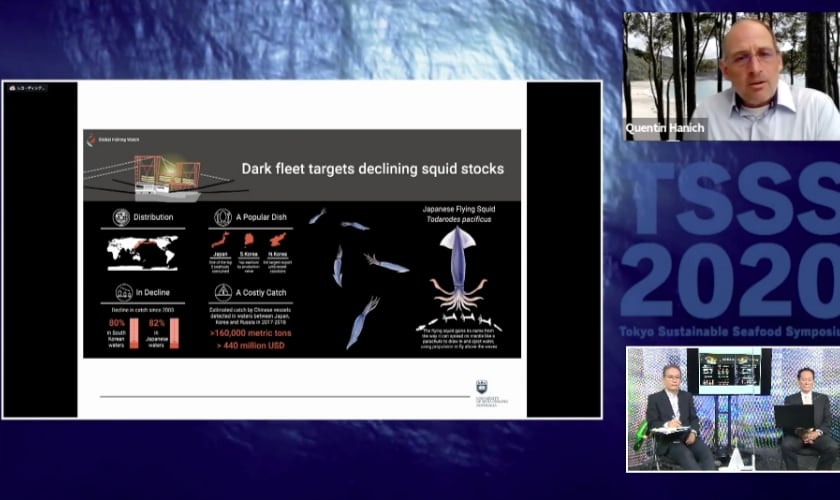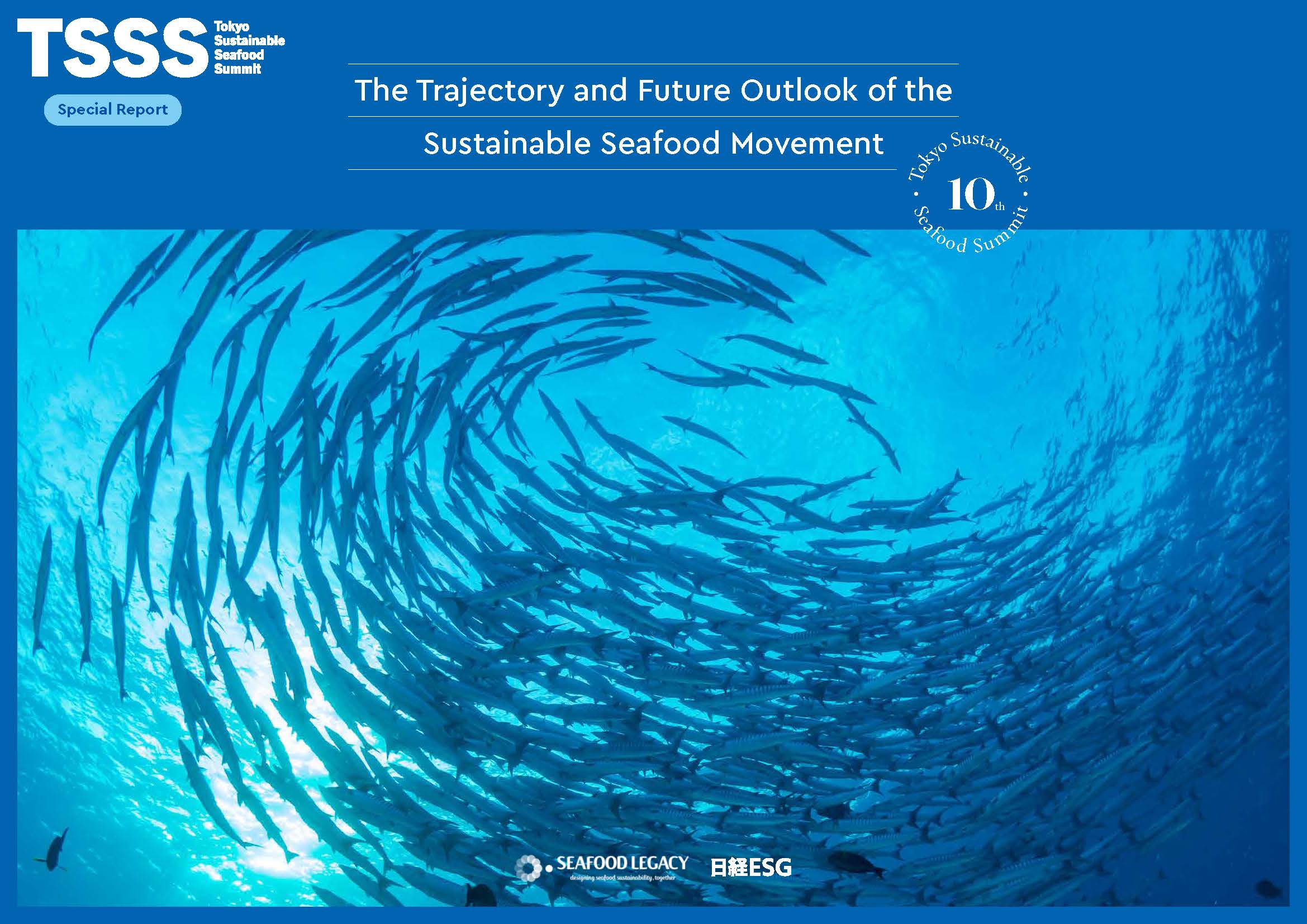

- TOP
- tsss10th

We are holding the 10th
Tokyo Sustainable Seafood Summit this year.
HISTORY OF MOVEMENT
-
NEWS
- ・Sustainable Development Goals (SDGs) adopted at the United Nations
WORLD
- ・Global Fishing Watch launched
- ・Human rights violations in the shrimp supply chain revealed at the Thai Union, etc
- ・Largest ever crackdown on smuggling of China
JAPAN
- ・Seafood Legacy founded
- ・Mr.Ayumi Katano became the first Japanese champion at the Seafood Champion Awards (advocacy category).
Business Trends
- ・Japan’s first MSC and ASC-certified independent restaurant BLUE opened.
2015TSSS
- ・The first Tokyo Sustainable Symposium held
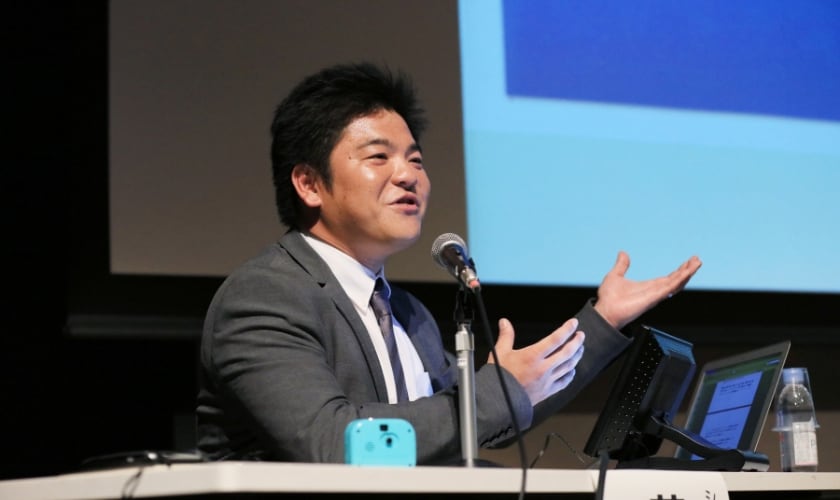
1st TSSS
2015年サイトを見る
Japan’s Challenge Starts with Fish: Sustainable Procurement and future of our food toward 2030 -
NEWS
- ・The Paris Agreement, an international framework on the climate change came into effect
WORLD
- ・The Seafood Business for Ocean Stewardship (SeaBOS) launched
JAPAN
- ・The Association for Preserving Seafood for the Future (President Taichi Takeuchi and Director Toshio Katsukawa) and the Association for Considering Iki City Tuna Resources (Chairman Minoru Nakamura) were selected as finalists in the Innovation and Vision categories at the Seafood Champion Awards.
- ・Mr.Yoshikatsu Ikuta, a Representative Director of Seafood Smart Institute gave a guest lecture at the 2016 Seaweb Seafood Summit in Malta.
Business Trends
- ・Kaiko Bussan Ltd. launched Japan’s first Fishery Improvement Project (FIP) for its sea perch fishery in Tokyo Bay.
- ・The Shizugawa Branch of the Miyagi Prefecture Fisheries Co-operative acquired Japan’s first ASC certification for oyster farming.
2016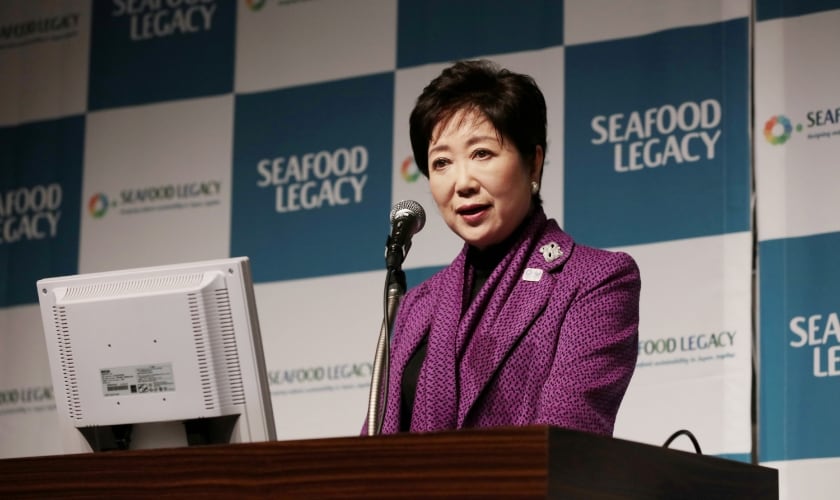
2ed TSSS
2016年サイトを見る
Japan’s Challenge Starts with Fish: Looking toward 2020 for Sustainable Procurement & Food -
WORLD
- ・The first UN Ocean Conference held in New York
- ・The Global Dialogue on Seafood Traceability (GDST) launched
JAPAN
- ・Japan ratified the Agreement on Port State Measures to Prevent, Deter and Eliminate Illegal, Unreported and Unregulated Fishing
- ・Aquaculture Stewardship Council (ASC) Japan launched
- ・IUU Forum Japan established
- ・Government Pension Investment Fund (GPIF) began full-scale ESG investment
- ・Chefs for the Blue launched
Business Trends
- ・Nippon Suisan Kaisha Ltd. (currently Nissui Corporation) conducted the first survey of the status of the marine resources used by their group companies.
2017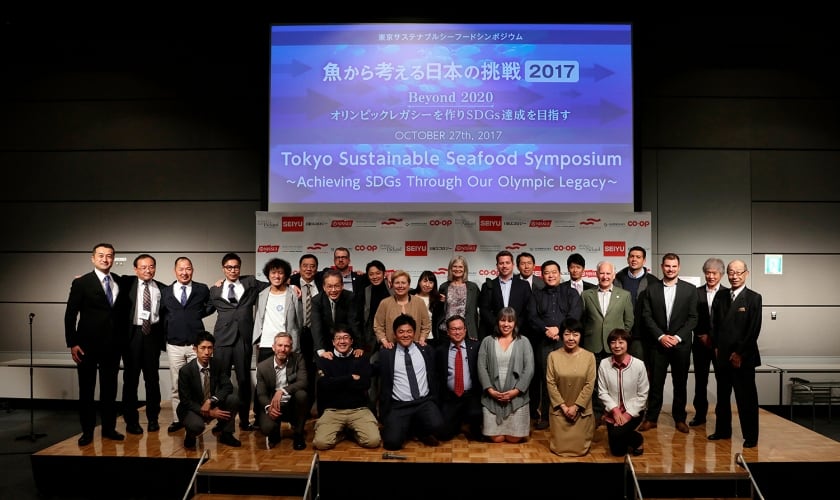
3rd TSSS
2017年サイトを見る
Japan’s Challenge Starts with Fish: Beyond 2020 Tokyo Olympics. Building the Legacy and Achieve the SDGs Goals -
NEWS
- ・Comprehensive and Progressive Agreement for Trans-Pacific Partnership came into effect
WORLD
- ・The first High Level Panel for a Sustainable Ocean Economy held in New York
- ・World Economic Forum launched Friends of Ocean Action
- ・United Nations Environment Programme Finance Initiative launched the Sustainable Blue Economy Finance Principles
- ・National Oceanic and Atmospheric Administration (NOAA) began the Seafood Import Monitoring Program (SIMP)
- ・The Hong Kong Sustainable Seafood Coalition (HKSSC) launched
Business Trends
- ・Panasonic Corporation offered the MSC/ASC-certified seafood menu in their company for the first time in Japan.
- ・Sales of the MSC/ASC-certified seafood at Aeon Retail Co.,Ltd. in the fiscal year of 2018 reached over 10 billion yen, which increased 20% from 8 billion in the previous fiscal year.
2018 -
WORLD
- ・Planet Tracker published a report "Perfect Storm" which evaluated the sustainability risks of major 41 seafood s companies in Japan
JAPAN
- ・Seafood Legacy CEO Wakao Hanaoka was awarded SeaWeb’s Seafood Champion for the Leadership Category
- ・MEL V2 recognized by the Global Sustainable Seafood Initiative (GSSI)
Business Trends
- ・Seven & i Holdings Co., Ltd. announced “GREEN CHALLENGE 2050”.
- ・Mitsubishi Corporation and Toyo Reizo announced Mitsubishi Corporation’s Bluefin Tuna Sustainable Sourcing Policy, which specified sustainable procurement and action plans.
2019TSSS
- ・Held off-line, Recorded the largest ever number of attendees!
- ・Japan Sustainable Seafood Award started
- ・World Benchmarking Alliance published its first version of “Seafood Stewardship Index (SSI)” which evaluates 30 world’s most influential seafood companies
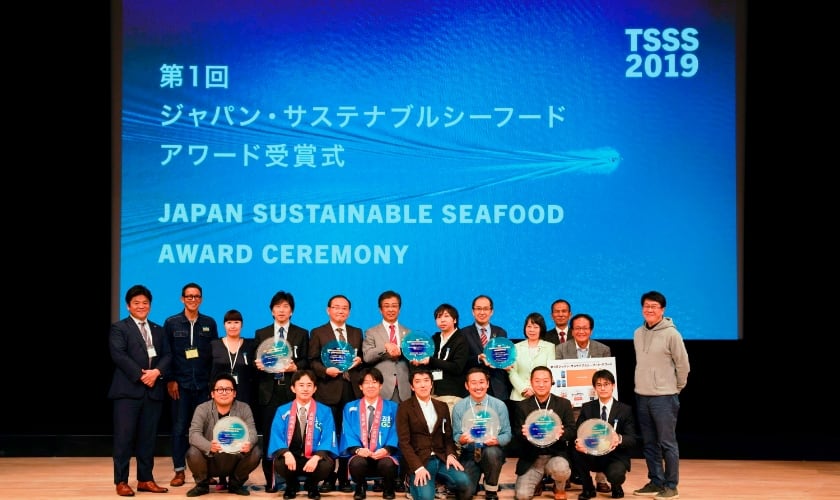
5th TSSS
2019年サイトを見る
For the coming Tokyo 2020 Olympics: Sustainable Seafood as Essence for SDGs and ESG management -
NEWS
- ・COVID-19 became a pandemic
WORLD
- ・EU "Farm To Fork" strategy announced
- ・Global Fishing Watch published a survey report on Chinese vessels’ engagement in large-scale IUU fishing of squid in North Korean waters
JAPAN
- ・Revised Fishery Act came into effect
- ・The Act on Ensuring the Proper Domestic Distribution and Importation of Specified Aquatic Animals and Plants promulgated
- ・Government formulated the National Action Plan on Business and Human Rights (2020-2025)
- ・The Fishery Act was revised and it states the sustainable use of fishery resources promulgated
Business Trends
- ・Maruha Nichiro announced the results of their
first survey of the status of the marine resources used by their group companies. - ・
- ・
2020TSSS
- ・The first online and six days long TSSS was organized
- ・All three SeaBOS Japanese companies participated in the TSSS together for the first time ever
- ・The unique sustainable seafood media “Seafood Legacy Times” launched. Delivering TSSS inspiration all year through this media!
-
NEWS
- ・Tokyo 2020 Olympic and Paralympic Games held
WORLD
- ・Digital Agency launched; Rising Expectations for Fisheries DX
- ・Global Seafood Alliance Started operations in Japan
- ・Planet Tracker report "Against the Tide" which surveyed the financial conditions of 70 seafood -related companies listed on the Tokyo Stock Exchange released
Business Trends
- ・Thai Union closed its first Sustainability-Linked Syndicated Loan worth THB 12 billion (400 million USD). Mizuho Bank, MUFG Bank, and Bank of Ayudhya were the Mandated Lead Arrangers and Bookrunners (MLABs) and Sustainability Coordinators.
- ・The Japanese Consumers’ Co-operative Union set "2030 Goals for CO・OP Brand Products" in alignment with the formulation of the "Consumer Co-op 2030 Environmental Sustainability Policy".
- ・Kibun Foods Inc. announced Sustainability Objectives by 2030 which include sustainable procurement of raw materials for the first time in the surimi industry.
2021TSSS
- ・Upscaled the TSSS title from Tokyo Sustainable Seafood Symposium to Tokyo Sustainable Seafood Summit to pursuit the highest goal
- ・World Benchmarking Alliance published its second version of “Seafood Stewardship Index (SSI)” which evaluates 30 world’s most influential seafood companies
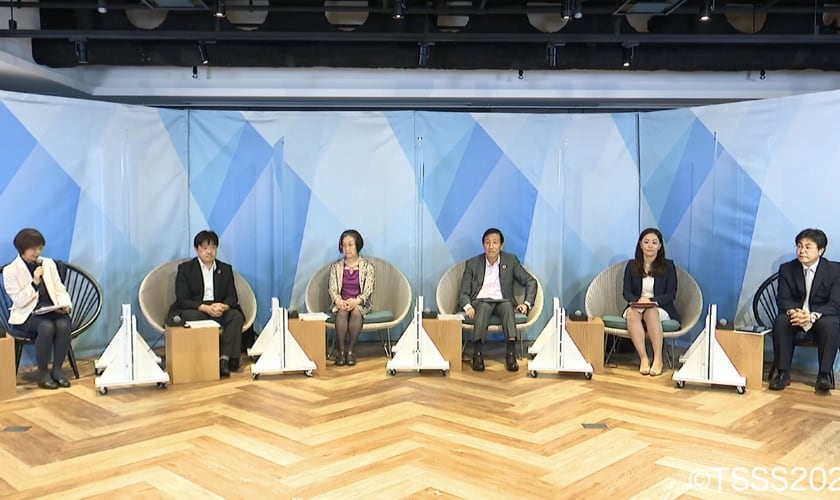
Build Blue Economy Toward 2030
2021年サイトを見る
Changing Japanese Seafood Industry by DX and ESG Investment -
NEWS
- ・Russia began invasion of Ukraine
- ・30 x 30 target set at COP15 of CBD inKunming-Montreal
WORLD
- ・Movie "Seaspiracy" released
- ・World Trade Organization (WTO) adopted the Agreement on Fisheries Subsidies
JAPAN
- ・Ministry of Economy, Trade and Industry formulated "Guidelines on Respecting Human Rights in Responsible Supply Chains"
- ・The Act on Ensuring the Proper Domestic Distribution and Importation of Specified Aquatic Animals and Plants came into effect; a framework was constructed to say "no" to IUU fishing in the world's three largest markets the EU, the US, and Japan
- ・The Act to Promote Environmental Burden Reduction Activities for Establishment of Environmentally Harmonized Food System (the “MIDORI Act) came into effect.
- ・The sustainable seafood list "Blue Seafood Guide TOKYO " released
- ・The movie ""Ghost Fleet"which depicts the problem of contemporary slavery at sea showed in Japan
Business Trends
- ・Maruha Nichiro Corporation issued Japan’s first blue bond.
- ・Hilton Japan, Korea & Micronesia region first achieved its global procurement goal in which all Hilton hotels need to procure seafood at least 25% from MSC/ASC-certified seafood.(Reached 32% in 2023!)
- ・Seven & i Holdings Co., Ltd. set “Seven & i Group Sustainable Sourcing Principles and Policies”.
- ・Mitsubishi Corporation and its group company, Toyo Reizo Co., Ltd. published revised “Tuna Procurement Guidelines” which specified 2030 goals.
2022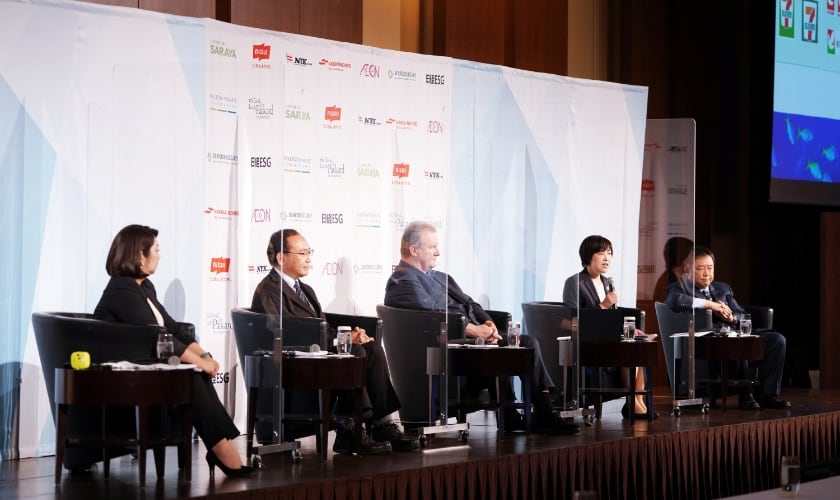
8th TSSS
2022年サイトを見る
Designing the Blue Ocean Strategy for the Seafood Industry:
Labor Rights, Biodiversity, and Climate Change—the Nexus of Sustainable Seafood Movement -
NEWS
- ・Israel began invasion of Gaza
- ・The Global average temperatures hit record highs
WORLD
- ・190 UN member states signed the High Seas Treaty which will conserve or protect 30% of the high seas by 2030
- ・The Coalition for Fisheries Transparency launched
- ・The Taskforce on Nature-related Financial Disclosures (TNFD) released framework v1.0
JAPAN
- ・Ministry of Agriculture, Forestry and Fisheries released "Guidance on Sustainable Management for Food Industry”
- ・Ministry of Agriculture, Forestry and Fisheries released "Guidebook for Respecting Human Rights in Food Enterprises”
- ・Volunteers interested in creating a sustainable fisheries industry, organized by Fisherman Japan and others, held the "Fisheries Future Summit".
Business Trends
- ・AEON Co., Ltd., and Seven & i Holdings Co., Ltd. publicly requested that all fish species be included in import regulations as part of IUU fishing countermeasures under Act on Ensuring the Proper Domestic Distribution and Importation of Specified Aquatic Animals and Plants at Cabinet Office Council for Promotion of Regulatory Reform’s Working Group and TSSS).
- ・Mitsui & Co. Seafoods Ltd. set “Marine Products Procurement Policy”.
- ・Yasutaka Suisan farm and the Hamasui processing plant, both members of the Ainan Fisheries Cooperative achieved Japan’s first BAP certification.
- ・Nissui Corporation published its group TNFD report.
2023TSSS
- ・First in-person event held in four years
- ・NIKKEI Blue Ocean Forum (Committee of Experts) launched, drawing on the knowledge, experience, and connections cultivated through TSSS, which has been jointly organized by the Nikkei ESG Editorial Department and Seafood Legacy for the past 10 years.
- ・World Benchmarking Alliance published its third version of “Seafood Stewardship Index (SSI)” that evaluates 30 world’s most influential seafood companies
- ・Seafood Traceability Engagement, SeaBOS’s Impact report, and ‘Corporate Responsibility to Respect Workers’ Rights in the Seafood Supply Chain Part 1: The Basics” were released
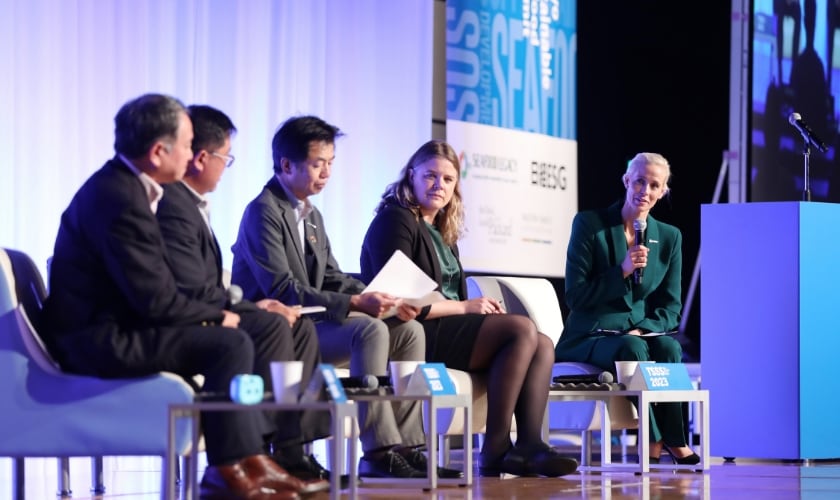
9th TSSS
2023年サイトを見る
Achieving the 2030 Agenda: Sustainable Seafood Strategies for Japan and Global Food Security -
JAPAN
- ・Among the 320 companies which are TNFD early adopters, Japan ranked at the top with 80 companies
Business Trends
- ・FOOD & LIFE COMPANIES Ltd. set “F&LC Human Rights Policies”.
- ・Izumisawa-Suisan Co. Ltd., acquired ASC certification for coho salmon farming and the world’s first ASC certification for marketable masu salmon farming.
202410th TSSS
2024年サイトを見る
Win the Mainstream- Nature-Positive, Ensuring Global Food Security and Respecting Human Rights” -
NEWS
- ・ Expo 2025 Osaka, Kansai, Japan will be held
2025TSSS
- ・Seafood Legacy 10th anniversary
11th TSSS scheduled to be held
This report provides an overview of the movement for sustainability in the Japanese seafood industry over the past decade,
future prospects, and messages from experts and stakeholders such as international organizations, governments, corporations,
financial institutions, NGOs, and academia.
CELEBRATIONS
Comments from TSSS speakers
reflecting on the past decade
-
Minako Iue
Chair and CEO, Sailors for the Sea Japan
View Comment -
Gregory V. Brown
GDST(The Global Dialogue on Seafood Traceability)
Executive DirectorView Comment -
Sotaro Usui
President, Usufuku Honten
View Comment -
Jenny Barker
FishWise
Executive DirectorView Comment -
Naoya Kakizoe
MEL Counci
PresidentView Comment -
Jim Cannon
SFP (Sustainable Fisheries Partnership)
CEO and FounderView Comment -
Mariko Kawaguchi
Specially Appointed Professor, Graduate School of Social Design Studies, Rikkyo University
Executive Advisor to CEO (for ESG and market value creation), Fuji Oil Holdings Inc.View Comment -
Chris Ninnes
Aquaculture Stewardship Council (ASC)
CEOView Comment -
Hiroko Sasaki
Representative Director, Chefs for the Blue
Food JournalistView Comment -
Teresa Ish
Walton Family Foundation
Senior Program Officer, Environment ProgramView Comment -
Akihiko Nishi
Nissui Corporation
General Manager, Sustainability DepartmentView Comment -
François Mosnier
Planet Tracker
Head of Oceans teamView Comment -
Takuya Hasegawa
Chief Editor of Yahoo! Japan SDGs, LY Corporation
Co-Founder, Fisherman JapanView Comment -
Rupert Howers
Marine Stewardship Council (MSC)
Chief Executive OfficerView Comment -
Kaori Fujita
Nikkei ESG, Senior Deputy Editor;
Professor, Tohoku University,
Green Goals Initiative and Graduate School of Life SciencesView Comment -
Martin Exel
SeaBOS (Seafood Business for Ocean Stewardship)
Managing DirectorView Comment -
Satoshi Matsumoto
Sustainability Strategy Department, Brand Strategy Division
Japanese Consumers’ Co-operative UnionView Comment -
Masanori Miyahara
Founder, afc.masa
Advisor to the Ministry of Agriculture, Forestry, and Fisheries of JapanView Comment
Jim Cannon
SFP (Sustainable Fisheries Partnership)
CEO and Founder
I congratulate Seafood Legacy and the Tokyo Sustainable Seafood Summit (TSSS) for all their work over the years. TSSS has helped align Japanese industry, society and government in many key ways. It has helped companies learn from one another, and reflect on what they need to do to learn from their mistakes and improve their performance.
Improving fisheries and protecting the oceans is a long-term challenge. By 2030, the industry really needs to make three major changes. The first is to realize that most countries and most governments don’t have the capacity to manage fisheries effectively on their own. And it’s the role of industry to figure out how to collaborate with governments to provide solutions. The second is to realize that sustainability is not just a project — it’s a long-term part of your business and a core element. The third is to realize that protecting the oceans means working at a larger scale across ecosystems.
I think Japan, with Seafood Legacy and the TSSS, is very well placed to lead this critical change in the sustainable seafood movement by 2030 and I look forward to working with you to help that vision be realized.
Teresa Ish
Walton Family Foundation
Senior Program Officer, Environment Program
I am so excited to be at the 10th Tokyo Sustainable Seafood Summit (TSSS). Ten years ago, Japan had very low awareness of the importance of sustainable seafood and sustainable fisheries. As Japan is one of the largest seafood consumers in the world, its absence meant a lot to our ability to improve fisheries worldwide.
When we started this work with Seafood Legacy, the goal for Japan was to learn from what others were doing, catching up to where they were. We’ve been learning that we need to think about due diligence, other tools such as in the financial markets, transparency and leadership to enhance sustainable seafood. And that is where Japan is really starting to shine. I see Japan going forward as a leader on some of these issues, as opposed to trying to play catch-up to other markets.
At the 10th TSSS, I hope that we can see that leadership really emerges, and see how the Japanese seafood companies and the Japanese financial markets are really starting to push and understand the importance of sustainability in their businesses, and on the health of the oceans.
Jenny Barker
FishWise
Executive Director
I'm so pleased to congratulate Seafood Legacy on the 10th Tokyo Sustainable Seafood Summit (TSSS).
This is a really important meeting on the global stage to talk about sustainable seafood, not just environmental sustainability, but also the important conversations happening globally on human rights and social responsibility in seafood supply chains.
At FishWise, we’re so pleased to have been a part of the TSSS for many years now, and we’re pleased to continue our work with Seafood Legacy on human rights due diligence working with companies to help improve supply chains around the world.
We’re also so happy to see how Japan has grown in its practice and regulation of seafood supply chains, and supporting and really becoming a global leader in sustainable seafood, in IUU fishing and in supporting human rights in seafood supply chains.
We are excited to see Japan continue to be a leader in the global community in sustainability far into the future. We look forward to continuing to support that work with the strong partnership that FishWise and Seafood Legacy have. I look forward to seeing you all in Tokyo in October 2024.
François Mosnier
Planet Tracker
Head of Oceans team
I’m really happy to celebrate the 10th Tokyo Sustainable Seafood Summit (TSSS). It’s been immensely gratifying to see such an important event grow over the years. I’ve been lucky enough to have contributed and been invited to this event, and it’s always been a pleasure and also a very important moment in Japan’s sustainability journey.
What I’ve really appreciated over the years with the work that Seafood Legacy is doing is how a broad collaboration of actors has been put together and contributed to improving the sustainability of seafood in Japan. There are things that we need to celebrate, such as a change in laws to control Illegal, Unreported and Unregulated (IUU) fishing and import regulation. That’s a major milestone.
But also at the corporate level, we are the first to always push companies to do more. And it’s true that some companies have done a bit more when it comes to bycatch reduction, for instance, or ghost fishing in Japan, however, there’s still a lot more work that needs to be done. We need to tackle overfishing, improve supply chain transparency, enhance monitoring and address human rights issues because all of these are extremely important, not just for environmental and social reasons, but for economic reasons as well.
By 2030, I hope we can celebrate the elimination of illegal fishing and overfishing in Japanese seafood. Yes, I hope to be with you to celebrate that in 2030.
Chris Ninnes
Aquaculture Stewardship Council (ASC)
CEO
It’s hard to believe that the Tokyo Sustainable Seafood Summit (TSSS) is a decade old. I can clearly remember those early days when there were the first presentations about the ambitions of the organization. So, a huge congratulations to you because you’ve made a difference.
When we look back at the history of sustainable seafood in Japan, the TSSS has made a great contribution and catalyzed a lot of actions over the past 10 years.
Japan has always been a leader in the seafood industry, with a huge historical presence in distant water fishing, with coastal fishing and coastal communities. Now, of course, seafood farming as well. Seafood has always been at the heart of Japanese culture. And I’ve eaten my most beautiful seafood meals in Japan.
All of the leading fishing corporations are based in Japan, and even some of the smaller ones, by Japanese standards, are bigger than their counterparts in other markets. So, there’s a huge presence internationally. Japan is a market that attracts a lot of seafood from within the region. I think the influence of Japan extends throughout the region and we see the benefits of that through those supply chains adopting sustainable practices.
Japan’s approach has been cautious when you compare it to some other countries on this journey toward sustainable seafood. But nonetheless, it’s been steady progress and that’s to be congratulated.
When you think about the history of Japan, what’s happening in the marketplace and what you see from consumers, there’s much more interest in sustainable seafood, and I think that will be translated into more ambitious actions in the marketplace. So, I really expect more from the market. I think that sustainable seafood has a great future in Japan and the TSSS will be a great partner on that journey.
Rupert Howers
Marine Stewardship Council (MSC)
Chief Executive Officer
The 10th anniversary of The Tokyo Sustainable Seafood Summit (TSSS) marks a decade of progress, collaboration, and dedication to promoting and celebrating sustainable fishing in Japan. We are deeply honoured to be part of this milestone event, alongside our partners at Seafood Legacy.
The Tokyo Sustainable Seafood Summit holds a special place in the hearts of all those who strive for a more sustainable future for our oceans. Japan, with its rich maritime heritage and vibrant seafood industry, plays a pivotal role in shaping the global seafood market. For a decade now, this summit has served as a catalyst for change, bringing together industry leaders, policymakers, and stakeholders to address the pressing challenges facing our oceans.
Through initiatives led by the Seafood Legacy including its TSSS, we have witnessed the development and growth of commitments to source and market sustainable seafood. Together, we have championed sustainable fisheries, promoted sustainable seafood, and empowered consumers to make sustainable choices.
With the demand for seafood expected to double by 2050, it is imperative that we all redouble our efforts to ensure all fisheries are managed sustainably, safeguarding the livelihoods of those that depend upon this incredible global industry, contributing to ocean health and food security.
MSC has an aspirational goal to engage over a third of landings in the programme by 2030 as our contribution, through the leadership of our partners, to delivering SDG 14 of the UN’s Agenda 2030.
We stand at a critical juncture in history where the decisions we make today will shape the future of our oceans for generations to come. My vision for the Japanese seafood industry is one of continued progress and innovation. By 2030, I hope to see a thriving market that prioritizes sustainability at every level of the supply chain. I believe that together, we can achieve a truly sustainable seafood industry.
The Japanese seafood industry has made notable strides in sustainability over the past decade. We have seen 13 fisheries achieve MSC certification, demonstrating their commitment to environmental stewardship and responsible fishing practices. We also have seen nearly 400 businesses achieve MSC CoC certification giving more choice to consumers who increasingly think they should switch to more sustainably sourced seafood. Many of the CoC certificate holders embrace sustainability not as a burden but as an opportunity for growth, innovation and especially investment for the future.
Our work is far from over. As we look to the future, we must redouble our efforts to ensure that every fishery, every market, and every consumer embraces sustainability as a fundamental principle. Together, we can build a future where healthy oceans, thriving communities, and sustainable seafood go hand in hand.
Thank you for your commitment, your passion, and your partnership in this vital mission.
Martin Exel
SeaBOS (Seafood Business for Ocean Stewardship)
Managing Director
Japan has made huge strides in the last decade and I think the Tokyo Sustainable Seafood Summit (TSSS) is a particularly good focal point where people can exchange ideas, have dialogue, understand each other’s positions, and then leave and think about how we can implement change in our organizations, in our local provinces or wherever it may be. And it’s been a very powerful advocate for sustainable seafood production in Japan, while not preaching to people about what they must do. That’s really important because it’s creating solutions that everybody can work with.
When I started my career in the seafood sector 45 years ago, it was thought that if the seafood was caught or produced by Japan, it was sustainable. That was OK. However, over the last four decades, we have realized that we need to do a bit more than that. We need to introduce science. Perhaps, we need to change the way we are fishing or how much we are fishing.
For me, that has been a particular change in the last five years. Watching and being a part of that from the outside has been very special because Japan is not just dependent on seafood, but seafood is part of the nation’s heart and soul. So, we have to look after it.
I believe that you will see much greater collective action and collaboration among Japanese fishing companies to create solutions by 2030. It would be great if I could see at the TSSS the leaders of the Japanese fisheries industry stand up and announce that these are the tangible outcomes and actions they have taken to address the key problems that exist with seafood production.
Gregory V. Brown
GDST(The Global Dialogue on Seafood Traceability)
Executive Director
We are very proud and honored to be involved with the Tokyo Sustainable Seafood Summit (TSSS) this year. It’s exciting for us because we’re celebrating with them 10 years of success in sustainability.
Nobody has moved the needle in Japan the way Seafood Legacy has and we have been proud to be associated with the company in the significant work it has been doing.
It is important that we support the major sustainability goals and objectives Seafood Legacy is working on in the Japanese marketplace for seafood toward 2030 and beyond.
We see traceability as a key element of those goals and we’re backing 100 percent the Japanese implementation of traceability according to the Global Dialogue on Seafood Traceability (GDST) standard.
Another really interesting aspect of the Seafood Legacy program, and especially the TSSS, is that it provides a picture of the sustainability program in Japan. In one location, at one event, you see the local, the regional and the international, and how it all comes together in the Japanese marketplace. And that’s very exciting for us.
Naoya Kakizoe
MEL Counci
President
Reflections of a long journey
It all started with a strange encounter.
In November 2014, the Monterey Bay Aquarium ran a seminar in Japan for people to learn about Seafood Watch, the marine conservation awareness program it had launched in the United States. There were fewer than 20 participants, including some young researchers, NGO members and only three people from the business community (including myself). I should also add that the event was covered by only one news media. One of the participants was Mr. Wakao Hanaoka, a member of Greenpeace Japan at the time. Mr. Hanaoka left Greenpeace the following month, and started taking concrete steps to kickstart a movement for the sustainable use of seafood. I still remember his impassioned facial expressions during the seminar, so it’s not hard to imagine that this seminar really galvanized him.
In April 2015, Mr. Hanaoka visited Ms. Kaori Fujita of Nikkei Ecology (now Nikkei ESG) to share his vision. They hit it off and agreed to jointly host the Tokyo Sustainable Seafood Summit (TSSS). Then, in July, Seafood Legacy was established. The first TSSS was held in November of that year. It was a brave beginning, especially considering the limited number of speakers from Japan.
I was invited as a special guest to the Ground Fish Forum (GFF) held in London in October 1994. It was a private gathering for European seafood industry stakeholders to discuss fish stock conservation and stable fish prices. The discussions later influenced the EU’s common fisheries policy and seafood eco-labeling and left a lasting impression on me. That’s where my long journey began. In due course, as president of Nissui, I took on the role of embedding a sustainable seafood business within the group, which would later become my lifelong commitment.
In May 2016, then-Fisheries Basic Policy Subcommittee of the Liberal Democratic Party raised the question of whether the sustainable use of seafood in Japan would be able to meet the demands of the upcoming Olympic and Paralympic Games Tokyo 2020, as well as an increase in exports. After a panel of experts conducted a study of global conditions, the Marine Eco-Label Japan Council (MEL) was established with the mission of achieving international standardization. I unexpectedly became the president of MEL and we started conducting activities under the banner of creating a globally recognized seafood eco-label for products originating from Japan. Our actions were watched with steely eyes and it was a rather inconspicuous start. However, everything changed when the promotion of seafood eco-labels was clearly specified as a policy in the government’s fourth Basic Plan for Fisheries, which was approved by the Cabinet in May 2017.
The small movement that began when Mr. Hanaoka’s passion inspired Ms. Fujita in those early days has now become a major ground swell involving society at large, partly because of the adoption thereafter of the SDGs by the General Assembly of the United Nations, which led to political and administrative engagement. And now, the TSSS is ready to be held for the tenth time in October 2024, having become a significant movement that resonates with people not only in Japan, but worldwide.
As someone who has walked a path not too dissimilar to that of the central figure of the TSSS due to a mysterious connection, I am now overwhelmed by a flood of emotions when I think about the long journey that lies ahead for this growing movement that was born from passion and action.
Satoshi Matsumoto
Sustainability Strategy Department, Brand Strategy Division
Japanese Consumers’ Co-operative Union
Initiatives in Japan have gained traction through TSSS
When TSSS started in 2015, even though the Sustainable Development Goals (SDGs) had just been adopted by the United Nations, terms like “sustainable” were still relatively uncommon in Japan.
Through participation in TSSS and by learning about the activities of Western companies and NGOs and becoming part of an international network, I feel that Japanese businesses have greatly progressed in terms of awareness and their initiatives.
In addition, the amendment of the Fisheries Act and the enactment of the Act on Ensuring the Proper Domestic Distribution and Importation of Specified Aquatic Animals and Plants were key milestones of the last decade.
On the other hand, the sharp decline in catches of popular species, such as the Japanese flying squid and Pacific saury, along with the surge in seafood price, has significantly impacted the lives of consumers. I certainly hope that TSSS will continue to evolve as a platform for collaboration between many stakeholders.
Akihiko Nishi
Nissui Corporation
General Manager, Sustainability Department
Congratulations to the 10th Tokyo Sustainable Seafood Summit!
I heartily congratulate the Tokyo Sustainable Seafood Summit (TSSS) on reaching the significant tenth milestone.
I have heard that when the TSSS was first held in 2015, even the term “sustainability” was not yet common in the seafood industry. But over the past decade, interest in sustainable seafood in Japan has grown by leaps and bounds. I believe that the TSSS has played a tremendously significant role in fostering this movement.
Many positive changes have been seen in the industry over the past 10 years. New rule-making and initiatives of business operators have made progress towards the realization of sustainable fisheries and aquaculture and the flow of money is also changing in a bid to support these efforts, for example, through the Taskforce on Nature-related Financial Disclosures (TNFD) and blue finance.
That said, there is still a mountain of problems that we must overcome, including overfishing, marine pollution, climate change and human rights violations in the supply chain. Tackling them will require even greater collaboration. The oceans are expected to play a crucial role in sustainable development, particularly in terms of food supply, fighting climate change and regional revitalization. I believe we can further unlock the enormous potential of the world’s oceans by responsibly and appropriately managing and effectively utilizing them.
I hope that the TSSS will function in an even greater capacity as a networking platform and facilitate even stronger collaboration between stakeholders in an effort to bring sustainable seafood into the mainstream in Japan’s seafood distribution.
Masanori Miyahara
Founder, afc.masa
Advisor to the Ministry of Agriculture, Forestry, and Fisheries of Japan
Close collaboration and continuation are the key
Fisheries policy reforms in Japan following the 2018 amendment of its Fisheries Act and the commencement of stock management for Pacific bluefin tuna are areas where the most significant progress was seen in seafood sustainability in recent years.
The former, the first major amendment of the act in 70 years, caused considerable friction between fishery operators and the government when they took effect, but things are now finally starting to get on track.
As for the latter, owing to the arduous efforts of fishery operators throughout Japan under the strict management of catch quotas, we are now seeing a significant recovery in the bluefin tuna stock.
Healthy seafood resources cannot be passed on to the next generation without the understanding and support from not only those involved in fisheries industries, but also consumers, distributors and the general public.
I strongly feel that with a close-knit network of a wide range of stakeholders, we must press ahead with our work, which is still only halfway done.
Kaori Fujita
Nikkei ESG, Senior Deputy Editor;
Professor, Tohoku University,
Green Goals Initiative and Graduate School of Life Sciences
The idea for TSSS was conceived in 2015 when Wakao Hanaoka visited my office.
He shared with me his passion to change society together with corporations. I thought we could create a compelling initiative if we team up, and combine my insights on biodiversity and corporate activities with his expertise on seafood sustainability and environmental issues.
Thus TSSS was established, co-sponsored by Nikkei ESG and Seafood Legacy.
Over the past decade, we have witnessed many changes: the SDGs, the Tokyo 2020 Olympic and Paralympic Games, the rise of ESG investments, and the Nature Positive movement.
TSSS has expanded its themes to include procurement, human rights, IoTs, sustainable finance, and international collaboration.
We will continue to build the future of TSSS by nurturing the spirit of dialogue between different stakeholders.
Minako Iue
Chair and CEO, Sailors for the Sea Japan
Realignment between NGOs and the government
In my view, what has changed the most in the past decade is the alignment between NGOs and the government. Both were previously heading in opposite directions, but since the enactment of the amendments made to the Fisheries Act in 2018, I feel that their aims have aligned.
At TSSS 2020, which took place shortly before the Act on Ensuring the Proper Domestic Distribution and Importation of Specified Aquatic Animals and Plants passed the National Diet, I was able to have a productive discussion with a representative from the Fisheries Agency of Japan during one of the sessions.
And in a panel discussion during TSSS 2023, representatives from NGOs in Japan, the US, Europe and South Korea shared with us the latest information about their own countries.
The power of NGOs hinges on their capacity to provide platforms in global community for creating new value with great speed and flexibility.
Global cooperation is essential today, and I will continue to collaborate with various stakeholders in and outside Japan, aiming for a sustainable society by improving the marine environment.
Hiroko Sasaki
Representative Director, Chefs for the Blue
Food Journalist
Fisheries Act amendments triggered changes in society
I think the most significant topic from the last ten years was certainly the enactment of the amended Fisheries Act in 2020.
I remember it was at the height of the COVID-19 pandemic, a time when there were some notable changes in consumer awareness toward food. These not only affected government policies, but also led to a significant shift in society.
For example, we experienced a sudden increase in press coverage, not only from the usual food media, but also in business and fashion magazines, the business and lifestyle sections of newspapers, and television news programs.
Meanwhile, fisheries stock management in Japan has not progressed as initially planned and yields from Japanese waters continue to decline.
Further impetus is urgently needed. I believe it is crucial that we build a system across the entire supply chain to sustain our oceans.
Mariko Kawaguchi
Specially Appointed Professor, Graduate School of Social Design Studies, Rikkyo University
Executive Advisor to CEO (for ESG and market value creation), Fuji Oil Holdings Inc.
Congratulations on the hosting of the tenth Tokyo Sustainable Seafood Summit (TSSS).
It feels like it was so long ago, but ten years have passed in the blink of an eye. I first met Mr. Wakao Hanaoka at a sustainable seafood event hosted by the David and Lucile Packard Foundation in the US city of Monterey in 2013.
Embarrassingly, even though I specialized in corporate environmental management, I did not fully understand why Western countries ― given their meat-eating culture ― were so passionate about the seafood conservation through movements like the MSC in Europe. I also assumed that Japan, with its strong tradition of seafood consumption, had historically practiced sustainable fisheries (or at least should have).
My misconceptions were shattered by what I learnt at the event in Monterey and through the people I met there. Globally, the seafood industry is a growth sector and there is a great deal of interest in fishery resources. To avoid overfishing, many leading fishing countries are now steering towards stock management-based fisheries. However, I was astonished at the gap between this movement and the reality in Japanese society, where the very concept of sustainable seafood industry was lacking despite the country’s professed love of seafood.
Six months after that encounter in Monterey, when Mr. Hanaoka came to talk to me about setting up a company to promote sustainable seafood, I felt that his aspirations carried a lot of promise. However, as I started to perceive the low level of basic awareness about fishery resources in Japanese society and the outdated practices of the industry, I also felt concerned about how much we could actually achieve given the difficulty of instigating change in Japan.
Also, the TSSS in the beginning was a narrow forum for information exchange for a small group of people, mainly fishing industry stakeholders and those with an interest in environmental issues, so deep down inside, I was actually anxious about whether it could continue. But with Team Hanaoka patiently and passionately continuing to improve the event, the lineup of participants became more diversified and the event got bigger in scale year after year. Today, the TSSS has become a flagship event for many stakeholders involved in the sustainable seafood industry. As a result, the Act on Ensuring the Proper Domestic Distribution and Importation of Specified Aquatic Animals and Plants was enacted, and the TSSS not only impacted the seafood industry, but has led to a broader awareness about fishery resources, including in the financial sector. It is a delightful surprise to see that this has contributed to the expansion of sustainable fisheries and also the development of financial instruments like blue bonds. With the past decade as a run-up, I look forward to the TSSS and our society making the next great leap forward.
Takuya Hasegawa
Chief Editor of Yahoo! Japan SDGs, LY Corporation
Co-Founder, Fisherman Japan
The emergence of local heroes over the past decade
Exactly ten years have passed since the establishment of Fisherman Japan (FJ). On the journey to restore livelihoods after the 2011 Japan earthquake and tsunami, FJ was launched with the goal of transforming the fishing industry to be cool, successful, and innovative.
Over the decade, many fishery operators, including FJ members, have started taking action in different regions across Japan, aiming to protect the sea and its fish for the future. So much so that they have become local heroes.
The promotion of sustainable seafood can only start from those who live with the sea.
I think the most significant topic of the past ten years may well be the emergence of these local heroes.
There are still many challenges that need to be addressed, but I am confident that these heroes will overcome them.
Sotaro Usui
President, Usufuku Honten
How do we meet our commitment to eliminate IUU fishing?
At the G20 Osaka Summit in 2019, a declaration was made to recognize the importance of addressing IUU (illegal, unreported and unregulated) fishing and to work toward ending IUU fishing worldwide.
Before this summit, the European Union and the US had already been spearheading efforts globally by establishing new laws and programs to stop seafood sourced by IUU fishing from entering their markets.
In Japan, cheap seafood sourced by those engaged in IUU fishing is still being imported from around the world, resulting in plummeting market prices.
It is no longer possible for honest fishery operators playing by the rules to make a living.
Going forward, Japan must consider how to keep their words in this international declaration. And we, as fishery operators, must also think and act to protect our longstanding fisheries for future generations.
INTERVIEW
Make sustainable seafood mainstream
This year sees the 10th Tokyo Sustainable Seafood Summit (TSSS). Wakao Hanaoka, CEO of Seafood Legacy, has been leading the movement to promote sustainability in the seafood industry by holding the summit each year since 2015. In a recent interview, Hanaoka reflects on the past decade and discusses the goal for 2030: “Make sustainable seafood mainstream.”
Wakao Hanaoka
After spending over 15 years of his youth in Southeast Asia, Wakao Hanaoka moved to the USA and graduated from the Florida Institute of Technology’s Department of Ocean Engineering and Marine Sciences. His illustrious journey in sustainable seafood began in the Maldives and Malaysia. In 2007, he took the helm at Greenpeace Japan, launching and leading the Sustainable Seafood Project with vision and dedication. Upon establishing his independence, in July 2015, he founded Seafood Legacy Co., Ltd. in Tokyo, marking a new chapter in his mission to preserve the legacy of abundant seafood, a testament to the vital interconnections of marine ecosystems, economy and society.
Hanaoka’s strategic vision involves forging robust alliances among a wide spectrum of stakeholders, including the seafood industry, financial sectors, governmental agencies, NGOs, academic institutions and the media on both national and international stages. His tireless dedication is catalyzing a paradigm shift, positioning environmentally sustainable and socially responsible seafood as the cornerstone of the Japanese and Asian seafood markets. He was named to SeaWeb’s Seafood Champion Award Leadership Category in 2019.
Click here to watch an interview summary.
-
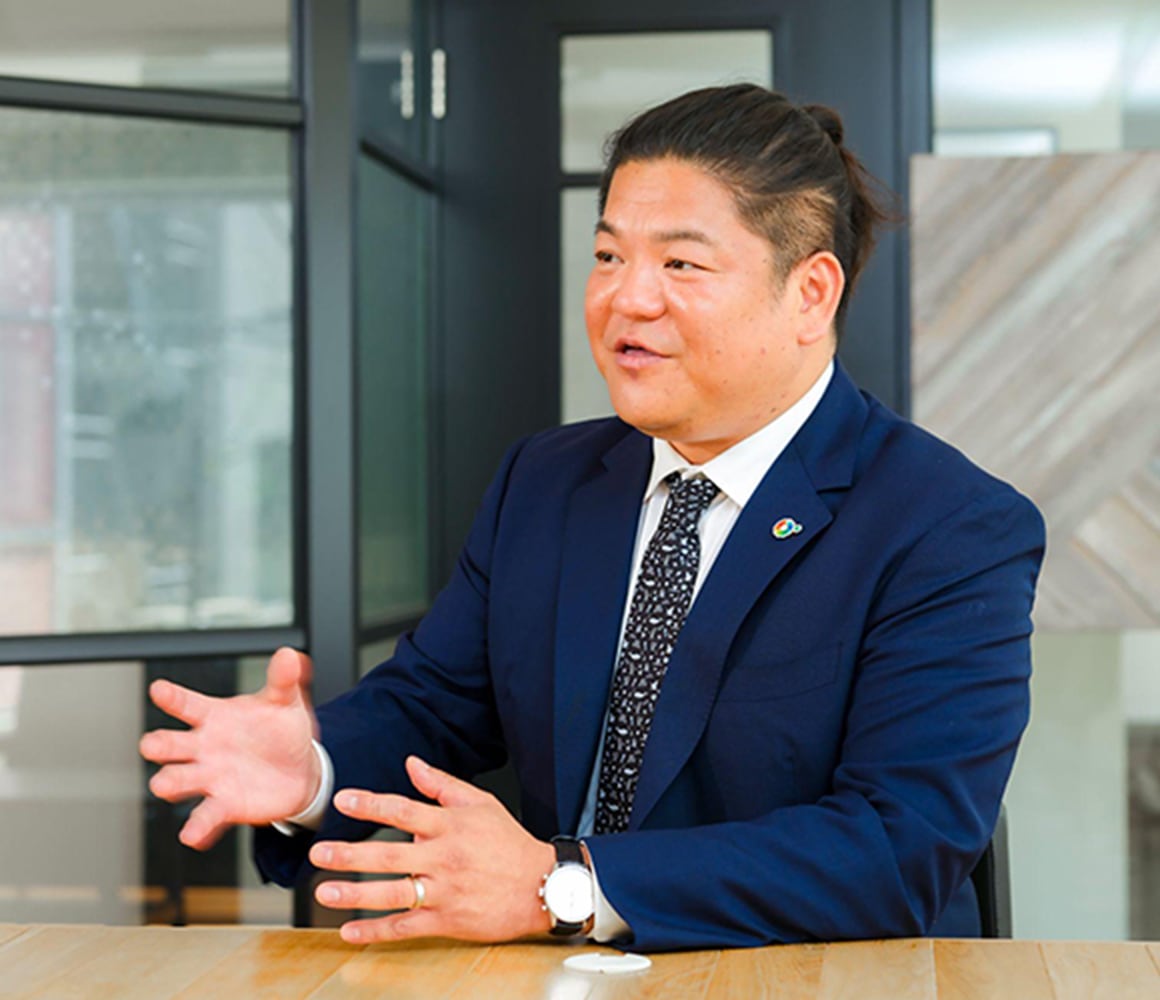
Looking back on the TSSS inauguration
― This is the 10th year since you started the Tokyo Sustainable Seafood Summit (TSSS) in 2015. What made you decide to organize an event like the TSSS?
Ten years ago, the concept of sustainability had not permeated throughout Japan’s seafood industry. In Japan, we have been taught that seafood is deeply rooted in Japanese culture, society and history. Also, we have experienced being the world’s largest seafood-producing country in the past.
This has made Japanese people defensive or even passive-aggressive toward the global movement of ensuring environmental sustainability and social responsibility. If we keep refusing to face the problem, Japan’s fishing industry may decline critically in terms of both volume and value. That was my concern in those days.
I was afraid that simply reacting negatively to international condemnation would not improve the situation. Also, I knew that there were quite a few individual leaders who understood the situation and thought that they had to take action.
However, because of Japanese culture and social norms, it’s hard to say “No” to elders in Japan and we tend to prioritize harmony. So, we are not comfortable speaking out and opposing the opinion of the majority.
Therefore, I thought that we needed a platform where those individual leaders could comfortably speak out what they thought for a better future. This is the primary reason that made me decide to launch TSSS.
― In 2015, you also established your own company, Seafood Legacy. It must have been a big challenge to launch a company and a big event at the same time. Did you have collaborators who understood and shared your vision?
Yes, before I launched Seafood Legacy, I used to work at an international environmental NGO and was in charge of ocean conservation issues. Through my work there, I met many people and got an understanding of international trends.
Thanks to my personal network, I found partners who agreed with my vision of improving the Japanese seafood industry’s system to make it more sustainable and responsible, and creating an impact not only in Japan but also on the global framework of the seafood industry.
For example, Nikkei BP, one of Japan’s major business media companies, has been collaborating with us on running the TSSS since its inauguration. Also, we’ve got support from international foundations such as the David and Lucile Packard Foundation and the Walton Family Foundation, as well as many international NGOs and corporations. -
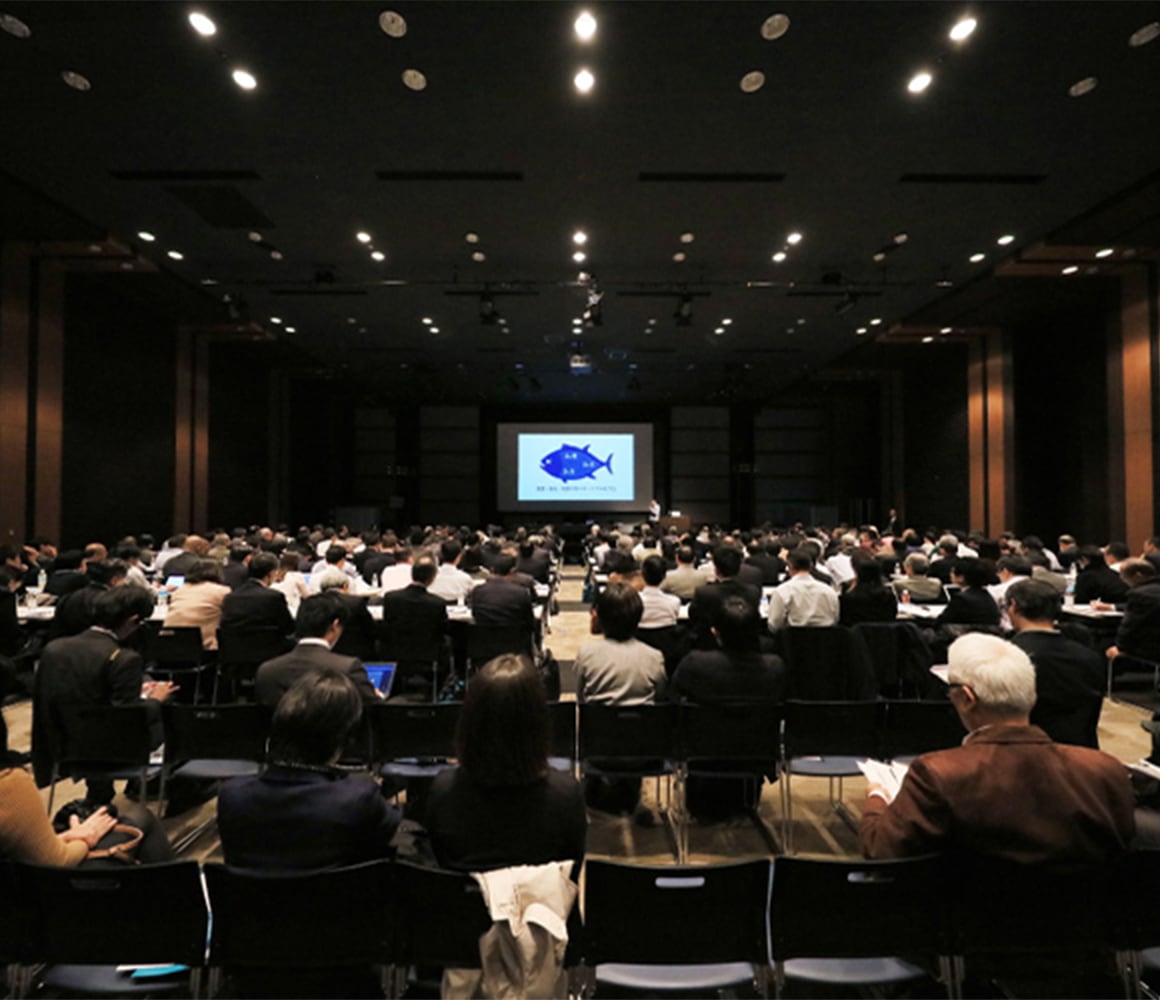
Changes over the past decade
― How has the sustainable seafood movement developed in Japan over the past 10 years? Compared to the situation in 2015 when you launched your company and the TSSS, have there been significant changes?
It was really an exciting decade. I think that Japanese society has never experienced such a rapid acceleration in our history in terms of improving sustainability and responsibility in the seafood sector.
On the policy front, we saw the revision of Japan’s Fishery Act in 2018. It was the first major revision in the 70-odd-year history of the law, which was enacted in the immediate postwar period.
Also, the Act on Ensuring the Proper Domestic Distribution and Importation of Specified Aquatic Animals and Plants was enacted in December 2020.
As Japan is one of the world’s leading seafood importers, what’s important is not only how we manage the Japanese fisheries, but also how we manage seafood imports to prevent seafood products that were caught by illegal, unreported and unregulated (IUU) fishing, which can undermine sustainability and conservation efforts, or that may involve human rights abuses from entering the Japanese market. This is the first law to regulate fishery products distribution in Japan, including imported products.
So, these were the two major legal changes, which was a great achievement for Japanese society during the past decade.
― How about the private sector?
There were a lot of initiatives in the private sector, too. Now we see that most seafood companies throughout the supply chain, including retailers, have some sort of policy and program for environmental sustainability and social responsibility, which we didn’t see 10 years ago. That’s a huge change.
Also, especially over the past two or three years, the finance sector has been taking the initiative in developing investment and loan programs that take into account environmental, social and governance (ESG) issues. So, there is a lot of improvement in the engagement of financial institutions for seafood companies.
In terms of domestic fisheries, more producers are working to gain certifications for sustainable fisheries and aquaculture. Especially, younger people in the fishing industry are coming together to establish a platform, and start to speak up more and more. As I said, it used to be very hard to do so in Japan. Not only producers, but also top chefs, for example, are establishing their own platforms to ensure sustainability and responsibility.
Also, many new non-governmental organizations and civil organizations have developed, and they are taking initiatives and making collaborative efforts toward sustainable seafood. -
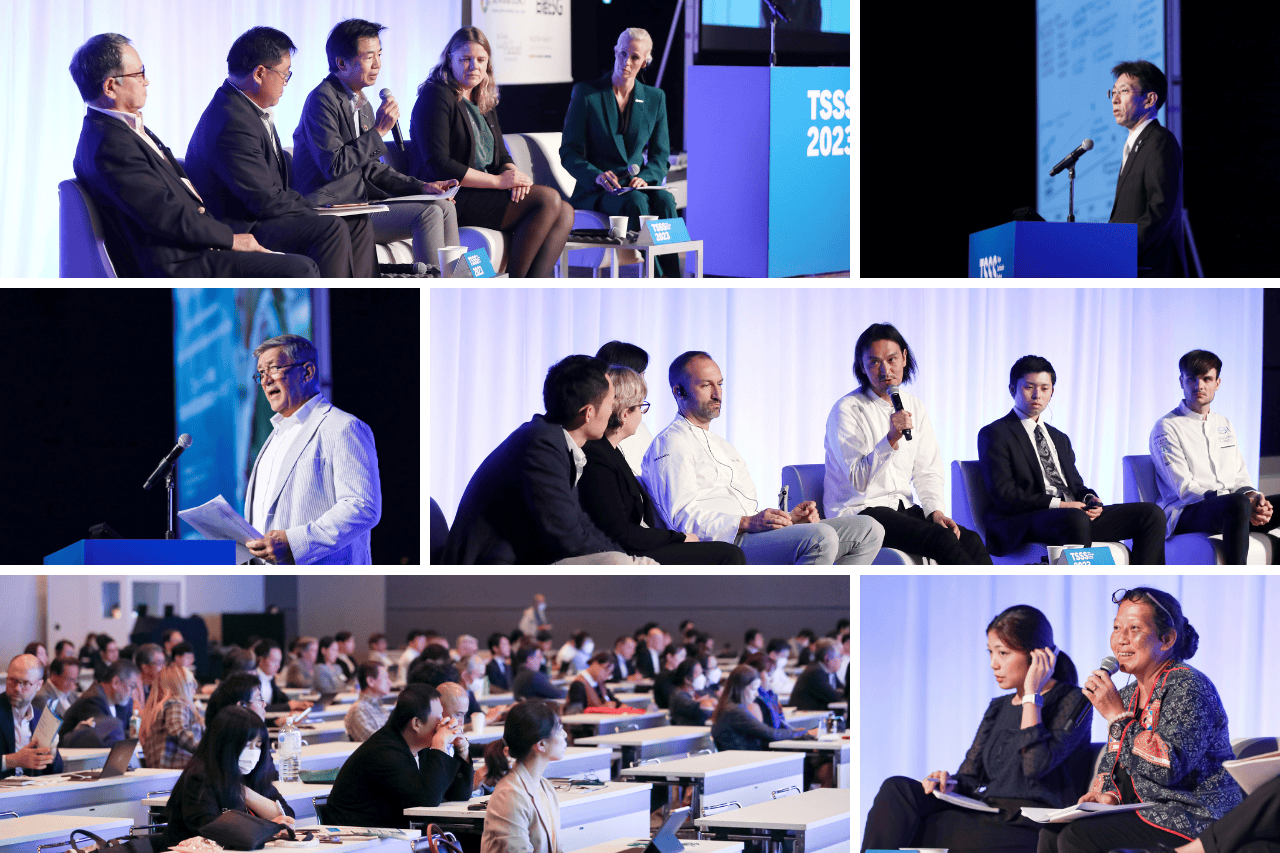
Key to change in Japan and the TSSS efforts
― What is the key to these many changes in Japan’s seafood industry?
I think that the primary key is that those stakeholders have become more comfortable speaking out about what they think is necessary, and I believe that the TSSS has contributed significantly to this.
At Japanese companies, people work like a sardine ball*. I am sure many people have heard the Japanese saying: “The nail that sticks up gets hammered down.” Japanese organizations value harmony very much. Individuals don’t want to take the lead, but they don’t want to be left behind, either. They want to be all together, moving in the same direction, like the fish in the sardine ball.
*Sardine bait balls are a remarkable marine phenomenon where countless individual sardines synchronously cluster into a dense, spherical formation. It is a last-ditch defensive measure when they are threatened by predators.
What strategically works in Japan is to bring the whole group of stakeholders together. It might take more time than in other cultures, but that’s a Japanese character trait. And once the whole group moves, everybody moves in a short period of time, since nobody wants to be left behind. That’s what we have experienced in the past decade.
― What were some of the biggest challenges in organizing the TSSS?
One of the most challenging parts has been how to design the program every year to direct the sustainable seafood movement in Japan, not only for Japan’s sake, but also in a way to contribute to the global seafood environment.
We have presented a program that is one step or half a step ahead of the actual situation in Japan. But there’s a huge gap between international initiatives and the situation in Japan’s seafood industry. In particular, coastal, small-scale players don’t have the capacity to make changes by themselves.
Therefore, how to balance the domestic and global situations has been the major issue every year. I remember that there was only one speaker from a Japanese company at the first TSSS in 2015.
I asked so many companies and individuals to talk about their initiatives or thoughts on the future of the seafood industry. However, most of them said that they were not comfortable talking about sustainability at that time.
Now, half of the speakers at the TSSS are Japanese. We don’t have to ask the companies anymore. Instead, they ask us for a spot at the summit where they can talk about their initiatives. I’m happy with the change.
Now our challenge is to decide which person to choose ― or not to choose. This is not always easy because we want to have all the stakeholders move together like a sardine ball.
― Which countries/regions had an impact on the promotion of the sustainable seafood movement in Japan?
In terms of improving the environmental sustainability and social responsibility of the global seafood industry, the EU and U.S. markets, two major seafood importers, have immense influence.
As Japan is the world’s third-largest seafood market, we always think about how we can bring the Japanese market to the level of those of the EU and U.S., and how we can collaborate with them to have a positive impact on the global seafood industry, especially on the producing countries and regions.
However, even if those big three markets ―― the EU, U.S. and Japanese ―― ensure, let’s say 100 percent sustainability and responsibility, the global seafood situation will not improve, as long as other seafood markets, including the emerging markets in the East and Southeast Asia, keep procuring seafood that may involve IUU fishing and labor rights abuses.
So, I hope that Japan will be able to not only improve the level of its seafood market, but also share its experience of such a market transformation with those new growing seafood markets in the world. -
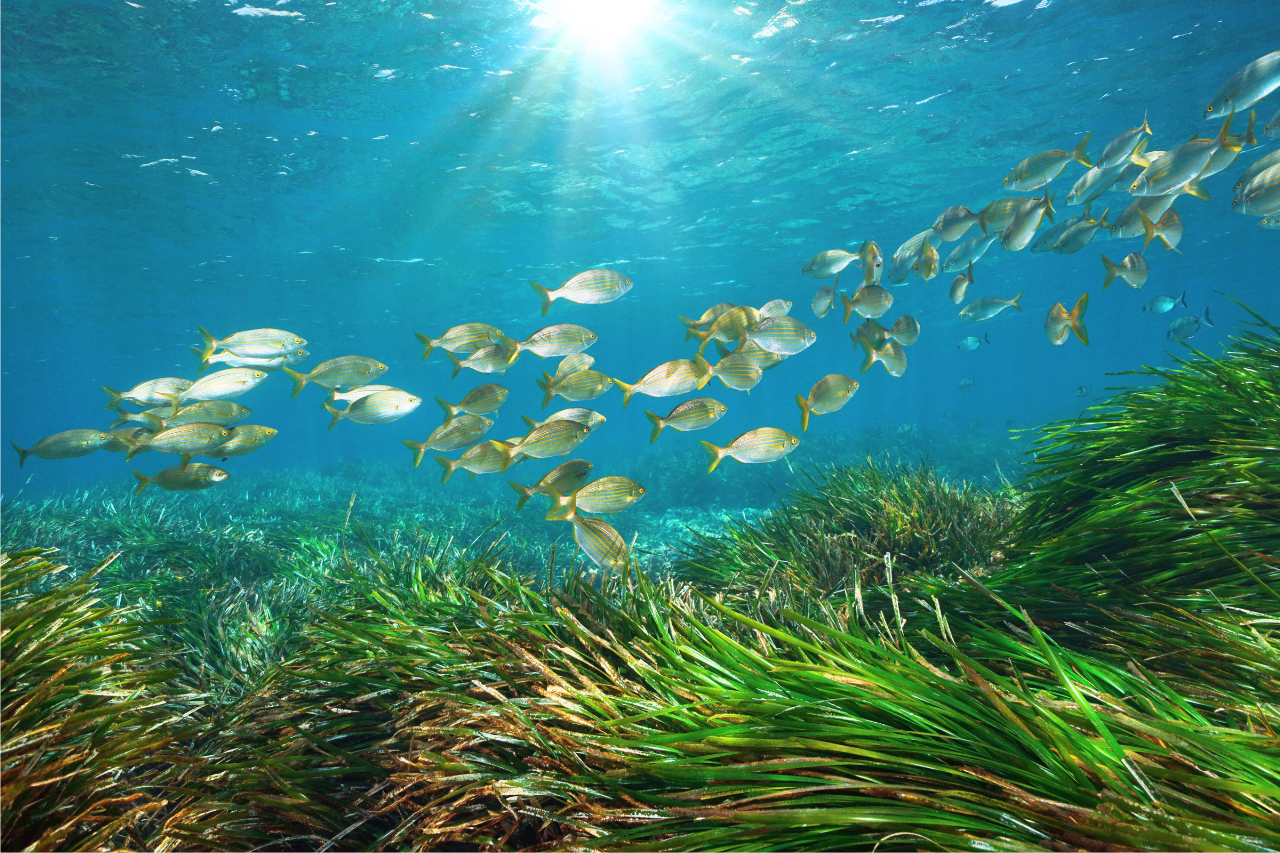
Make sustainable seafood mainstream by 2030
― Marking the 10th year, you have set a new goal toward 2030: Make sustainable seafood mainstream. Please give us a concrete explanation of this goal.
The availability of sustainable seafood products has expanded to a certain degree in Japan. However, individual consumers still have to choose which supermarket to go to or which restaurant to dine at if they want sustainable seafood.
I want to change this so that consumers in Japan don’t have to worry about which product to choose if they want sustainable seafood. Whatever they want to buy, the seafood products should be sustainable and responsibly managed for future generations. That’s what we want to establish in the Japanese market by 2030.
Around half of the seafood consumption in Japan depends on imports, while the other half is domestically produced. If the Japanese seafood market becomes sustainable, it will have a positive impact on the imported seafood products and the producing areas around the world. And it also becomes an incentive for domestic fisheries to improve sustainability and responsibility.
― What are your strategies for achieving the 2030 goal?
To achieve the 2030 goal, the entire seafood industry system must be updated. The ability to make decisions and implement action is needed in Japan. This is why Seafood Legacy is based in Japan. I strongly believe that if we can leverage Japan’s experience and strengths for the prosperity of future generations, we can contribute not only domestically but also globally.
To make decisions and take action, it is necessary to share and embrace the 2030 goal as a common vision, and to have leadership within each organization, both corporate and governmental, that is truly committed to tackling this issue. To this end, Seafood Legacy provides consulting services and policy recommendations.
It is crucial that downstream companies such as retailers, restaurants and suppliers implement human rights due diligence and full-chain traceability. Upstream producers must focus on leveraging digital transformation (DX) to collect, analyze and utilize their catch data and marine environmental data effectively. They also need to break away from the dependence on subsidies and prepare to enter sustainable seafood markets overseas.
To support these transitions, one of Seafood Legacy’s strategies is to increase incentives such as ESG investment and financing.
However, individual actions by leaders in each sector have limitations. To overcome this, Seafood Legacy operates multiple platforms, including the TSSS, to combine and synergize the initiatives of various stakeholders.
The movement toward sustainable seafood is expected to grow through the repeated two-pronged approach of market transformation and policy shift, which Seafood Legacy refers to as its “Theory of Change.” We work tirelessly to accelerate the pace of this two-pronged progress and ensure it moves in the right direction without missteps.
― Do you have a message for TSSS 2024 participants?
We are very much looking forward to seeing all the stakeholders at the upcoming TSSS 2024 in Tokyo. We want to share with all of you the excitement of the progress of the movement in this decade, as well as to co-design the road map that will lead us to the 2030 goal together.
I understand that it’s impossible to achieve this goal through Seafood Legacy alone. Also, it’s not only about Japan. It’s important that global players are coming to Japan to have constructive and positive discussions with us all.
So please come to TSSS 2024. Let’s celebrate the achievements and let’s face the new challenges together.
Discover More Articles, Check the SEAFOOD LEGACY TIMES


Have you registered for TSSS2024?
Registration is required.
Please sign up here if you haven't yet.
